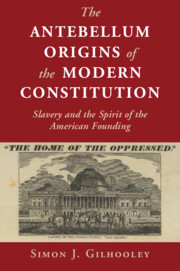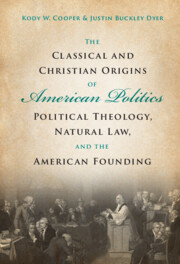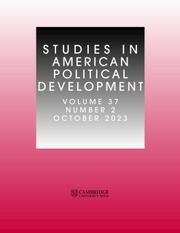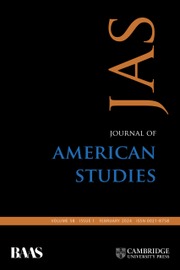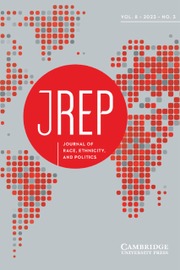The Antebellum Origins of the Modern Constitution
This book argues that conflicts over slavery and abolition in the early American Republic generated a mode of constitutional interpretation that remains powerful today: the belief that the historical spirit of founding holds authority over the current moment. Simon J. Gilhooley traces how debates around the existence of slavery in the District of Columbia gave rise to the articulation of this constitutional interpretation, which constrained the radical potential of the constitutional text. To reconstruct the origins of this interpretation, Gilhooley draws on rich sources that include historical newspapers, pamphlets, and congressional debates. Examining free black activism in the North, Abolitionism in the 1830s, and the evolution of pro-slavery thought, this book shows how in navigating the existence of slavery in the District and the fundamental constitutional issue of the enslaved's personhood, Antebellum opponents of abolition came to promote an enduring but constraining constitutional imaginary.
- Charts the development of the relationship between the US Constitution and slavery in a political history
- Offers a new understanding of the political and constitutional significance of debates over slavery in Washington, DC in the 1830s
- Provides an interdisciplinary account of the development of a view of the US Constitution as tied to the founding era
Reviews & endorsements
'Gilhooley gives us a new and profoundly original account of the roots, during the era of slavery, of today's battles over constitutional interpretation. In the process, he reconceives the political legacy of the 1820s and 1830s, scrambles our contemporary assumptions about the ideological meaning of the different theories of the Constitution, and thoroughly dissects the American worship of the founders. This is a terrific book and one to be returned to again and again.' Aziz Rana, Cornell University
'This book is convincing and profound: a real tour de force. Gilhooley is immensely clarifying on points of history, political theory, and legal/constitutional development precisely because he integrates them. His argument that originalism emerged as a response to the exigencies of antebellum debates will be a touchstone for a very long time.' David Waldstreicher, The Graduate Center, City University of New York
Product details
October 2020Adobe eBook Reader
9781108857222
0 pages
This ISBN is for an eBook version which is distributed on our behalf by a third party.
Table of Contents
- Introduction
- 1. The Constitutional Imaginaries of the Missouri Crisis
- 2. The Declaration of Independence and Black Citizenship in the 1820s
- 3. Abolitionism and the Constitution in the 1830s
- 4. The Slaveholding South and the Constitutionalization of Slavery
- 5. Theories of the Federal Compact in the 1830s
- 6. Slavery, The District of Columbia, and the Constitution
- 7. The Congressional Crisis of 1836
- 8: The Compact and the Election of 1836
- 9. The Afterlife of the Compact of 1836
- Conclusion.

